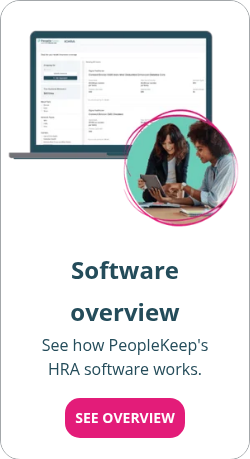How does the ICHRA special enrollment period work?
By Holly Bengfort on July 21, 2025 at 2:15 PM
Employees looking to participate in their employer’s individual coverage health reimbursement arrangement (ICHRA) need a qualifying individual health insurance plan to do so. If they don’t already have the right type of coverage, they may wonder how they can secure it in time to participate in the benefit. Under the ACA, you can only enroll in a health plan during Open Enrollment unless you qualify for a special enrollment period (SEP).
Understanding how offering an ICHRA creates a SEP is important for anyone looking to make the most of their health insurance options. Whether you're a business owner, HR professional, or employee, knowing the details of the SEP can help you ensure you don't miss out on valuable opportunities.
In this article, we’ll break down the key components of the ICHRA special enrollment period to help you navigate this health benefit with confidence and clarity.
In this blog post, you'll learn the following:
- How the ICHRA helps employers and employees cut healthcare costs.
- How offering an ICHRA is a qualifying life event that triggers a SEP.
- How PeopleKeep can help your employees find suitable health coverage with ease.
What is the ICHRA?
The ICHRA is a cost-effective alternative to a traditional group health plan. Instead of employers purchasing a group plan for their employees, they reimburse them for their individual health insurance premiums. This not only saves them money but also allows employees to pick the health plans that work best for them.
Some types of medical expenses that an ICHRA can cover include:
- Monthly premiums for health, vision, and dental plans
- Preventive care
- Doctor visits
- Prescription drugs
- Over-the-counter medication
Since ICHRAs have no maximum contribution limits, employers can offer as much as they’d like in allowances. They can set different allowance amounts and eligibility rules for up to 11 classes of employees, such as full-time employees or seasonal employees.
Here's how an ICHRA works:
- Employers determine their plan design and set monthly allowances for their employees.
- Employees make healthcare purchases using their own money.
- Employees submit proof of incurred medical expenses to their employer or HRA administrator for reimbursement.
- Once employers approve the medical expense, employees receive tax-free reimbursements up to their allowance amount.
To participate in this benefit, employees need their own individual health insurance policies that provide minimum essential coverage (MEC). They can purchase their individual plans directly from an insurance company or through the Health Insurance Marketplace.
Employees who are already enrolled in an individual plan that’s being subsidized through premium tax credits can choose to opt out of an ICHRA and retain those tax credits in some cases. The ability to do this depends on affordability.
In 2026, an ICHRA will be affordable if an employee isn't expected to pay more than 9.96% of their household income for a self-only silver plan after using their allowance. If the ICHRA allowance is affordable, employees can't receive premium tax credits, even if they opt-out. If the allowance is unaffordable, employees can opt-out and still collect their premium tax credits.
What is a SEP?
A SEP is a specific time frame outside of the annual enrollment period during which individuals can enroll in or change their health insurance plans.
Qualifying life events trigger SEPs, such as:
- Getting married
- Having a baby
- Moving to a new area
- Losing health coverage
- Being offered new health coverage
- Losing health coverage
SEPs are important because they give people a chance to sign up for health plans if they miss an open enrollment period. Lasting 60 days after a qualifying event, SEPs help ensure continuous healthcare coverage.
Currently, the annual Open Enrollment Period is November 1 through January 15 in most states. However, a new rule is shortening the window to begin on November 1 and end on December 15 in all states selling health plans on the federal Health Insurance Marketplace. This will be effective for the 2026 Open Enrollment Period for coverage starting on January 1, 20271.
How does the ICHRA SEP work?
When employers offer an ICHRA to their employees, it triggers a SEP2. This occurs since they're offering new health coverage.
The triggering event for ICHRA SEPs is the first day employees are eligible for coverage. Whether the SEP starts 60 days before or ends 60 days after the triggering event depends on if the employee receives advance notice of the benefit.
Employers offering an ICHRA for the first time or renewing their benefit for a new plan year should give employees at least 90 days notice prior to the beginning of the new plan year. If a company provides adequate notice before the benefit starts, the 60-day SEP will begin before the triggering event.
Employers must provide notice to employees who become newly eligible for an existing ICHRA benefit by the day their plan eligibility starts, at the latest. If a company extends the benefit to a new employee in the middle of a plan year and only gives them a few days notice before their benefit start date, the 60-day SEP ends after the event that triggers eligibility.
If employees are hired less than 120 days before the start of the first plan year of the HRA, the employer can give the notice to those employees by the date when the HRA is set to begin.
How does the SEP work if the plan renews mid-year?
If an employer has an ongoing ICHRA that renews on a non-calendar year3 basis, there is a SEP4, but employees who want to change plans can only switch to one that's within the same metal level. If no other plans at that metal level exist, they can move up or down one level.
However, if an employer offers an ICHRA for the first time that starts mid-year, there are no restrictions in place for the SEP.
How does the SEP work if an employee is hired mid-year?
Employees hired after Open Enrollment and after the start of a plan year can sign up for individual health insurance coverage starting on the first date that they’re eligible for the ICHRA and up to 60 days after their eligibility date.
You must adjust the allowance amount you offer to these employees based on the number of months remaining in the plan year, including the month with their coverage effective date.
How can employers help employees shop for individual health insurance coverage?
Employers offering an ICHRA can assist by referring their employees to a broker or online service to help them shop for coverage. However, they can't advise them on different plan options. References should be unbiased and shouldn't steer individuals toward a particular health insurance provider or coverage.
However, PeopleKeep can make this process much easier. Our integrated shopping experience guides employees toward finding the right health coverage that fits their needs. They can compare individual health plans directly from their PeopleKeep account.
When employers use PeopleKeep as their ICHRA administrator, they also receive:
- HIPAA compliance and fewer administrative tasks: We review employee reimbursement requests for their eligible expenses
- Automatically generated legal plan documents
- Necessary notices are sent automatically on their behalf
- Award-winning customer support
Our user-friendly software makes providing an HRA simple. We take care of the pesky administrative tasks so employers can focus on other aspects of their business.
Conclusion
ICHRAs provide more flexibility and cost control than traditional group health plans. Employees can choose the individual health coverage that suits their needs instead of getting stuck with a one-size-fits-all group health plan.
The ICRHA SEP allows eligible employees to enroll in individual health insurance plans outside of the standard open enrollment period. During this 60-day time period, they also have the option to opt out of the ICHRA offering.
1. Patient Protection and Affordable Care Act; Marketplace Integrity and Affordability
2. HRAs and other account-based group health plans final rules3. HealthInsurance.org non-calendar year renewal
4. An SEP if you’re offered a QSEHRA or ICHRA
Check out more resources
See these related articles

Does an HRA work with Medicaid?
Find out if an HRA can be used with Medicaid. Learn how HRA reimbursements work for employees enrolled in Medicaid and what limitations may apply.

How to prepare for open enrollment as an employer
Open enrollment season is approaching, and it's important to be prepared. Discover what you need to know before open enrollment with this helpful guide!

What is the Health Insurance Marketplace?
Discover the benefits of enrolling in a health insurance plan through the Health Insurance Marketplace. Learn what it is and how it can benefit you.



